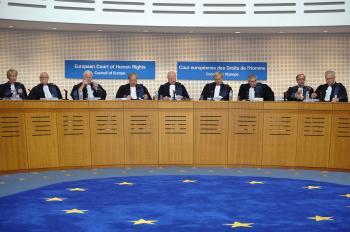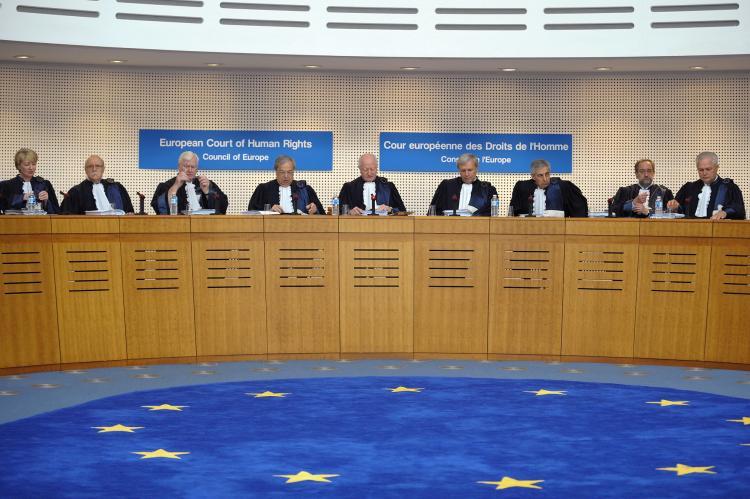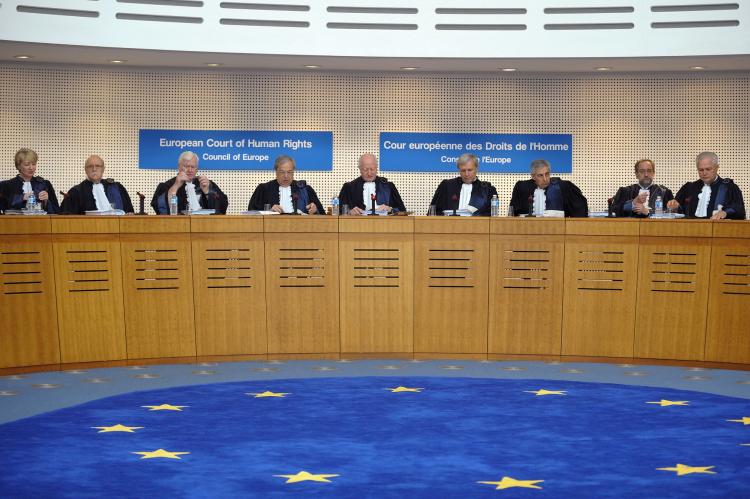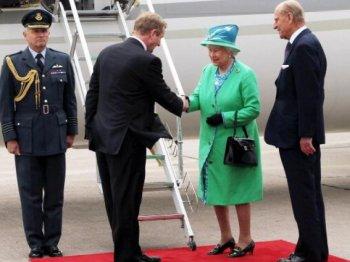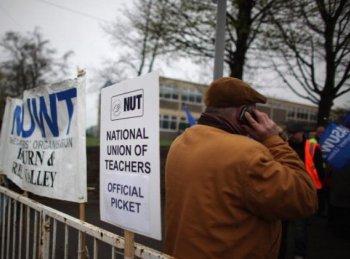British laws face triple jeopardy, running the gauntlet of three supreme courts, which undermines the sovereignty of Parliament, says a new report that recommends cutting ties with the European Court of Human Rights.
Policy Exchange says that a ruling by the European Court of Human Rights (ECHR) on the right of prisoners to vote in the U.K. highlights the growing conflict between “incompetent” judges in Strasbourg, and the will of the elected Parliament in London.
The ECHR recently ruled illegal the U.K.’s blanket denial of the vote to all prisoners.
The report by the right-wing think tank highlights various shortcomings of the ECHR, saying it needs considerable overhauling. If Britain cannot negotiate changes to the way the court is run in the next two years, it should jettison its relationship with the court altogether.
Lord Hoffmann, a former Law Lord (judge of the supreme court of appeal), said in his foreword to the report by former government adviser Michael Pinto-Duschinsky that the Strasbourg court has “taken upon itself an extraordinary power to micromanage the legal systems of the member states.”
Lord Hoffman writes: “The tendency has been to say that there is nothing to be done. We are stuck with the Convention and the European Court of Human Rights and unless we are willing to cast ourselves as a pariah state and get expelled from the European Union, we must accept the court’s jurisdiction.”
Blair Gibbs, head of crime and justice at Policy Exchange, told the BBC, “Votes for prisoners has brought to public attention the growing conflict between judges and the wishes of our own elected Parliament.”
“The public favor such cases being decided in the U.K., not by foreign judges sitting in a remote court,” he said.
The court in Strasbourg, which is separate from the European Union, was created to protect human rights in post-Nazi Europe. It effectively overpowers the British courts, and even the sovereignty of the law-making Parliament, says Pinto-Duschinsky.
He says that the U.K. Human Rights Act in 1998 was the legal game-changer. It enshrined the European Convention on Human Rights in U.K. law, and in doing so bound U.K. judges to the precedents set by judges in Strasbourg, and made British lawmakers subservient to the ECHR.
”One core problem about the profound changes that have been taking place in the structures of government in the United Kingdom is that key reforms have been discussed in a semi-private world of human rights lobbyists and some specialist lawyers and legal academics,” writes Pinto-Duschinsky.
“They have attracted relatively little notice or discussion from students of British government let alone from members of the general public. How many people realize that the U.K. effectively has no fewer than three separate ’supreme' courts which sit respectively in London, Luxembourg, and Strasbourg?” he added.
But in recommending to cutting ties with the court, Pinto-Duschinsky is not suggesting the U.K. cast aside the rights that are specifically handled by the court, which are already enshrined in British law under the human rights bill. The criticism is that the ECHR court itself is incompetent, does not account for cultural differences between nations, is unaccountable, supersedes national sovereignty, and stretches the text of human rights law beyond its intended scope. The report says that the ultimate arbiter of British law should be the Supreme Court in London.
The report casts aside the assertion that leaving the ECHR would only be possible if Britain left the EU. It says that there is “strong evidence” from legal experts that ties could be cut and membership with the EU retained.
Prime Minister David Cameron himself recently said that the idea of giving prisoners the vote made him feel “physically ill.” But he appeared to be heading toward a compromise of granting the vote to prisoners sentenced to fewer than four years, or perhaps even just one year, in a bid to avoid lawsuits, which he said could reach over £160 million ($258 million).
Foreign Secretary William Hague said on Monday, “They are interpreting the law in a new and I think deeply unhelpful way. I’ve always been opposed myself to prisoners having the vote.
“What we’ve decided to do given our great distaste for this, is to do the minimum that is necessary to comply with that ruling and not to extend the right to vote to the worst offenders,” reported The Telegraph.
Last week, Aidan O'Neill QC, a barrister expert in prisoners’ rights, told the Commons political and constitutional reform committee that things were “reaching crunch point now.”
On Thursday, Parliament will vote on a motion that completely defies the Strasbourg ruling on prison votes. The motion, put forward by Conservative member of Parliament David Davis and former Cabinet Minister Jack Straw, says that no prisoner should be granted the vote other than those jailed for debt default or contempt of court.
In a challenge to the fundamental authority of the ECHR over the U.K. Parliament, the motion also says that the decision on whether prisoners should be allowed to vote or not should be one for democratically elected lawmakers.
Policy Exchange says that a ruling by the European Court of Human Rights (ECHR) on the right of prisoners to vote in the U.K. highlights the growing conflict between “incompetent” judges in Strasbourg, and the will of the elected Parliament in London.
The ECHR recently ruled illegal the U.K.’s blanket denial of the vote to all prisoners.
The report by the right-wing think tank highlights various shortcomings of the ECHR, saying it needs considerable overhauling. If Britain cannot negotiate changes to the way the court is run in the next two years, it should jettison its relationship with the court altogether.
Lord Hoffmann, a former Law Lord (judge of the supreme court of appeal), said in his foreword to the report by former government adviser Michael Pinto-Duschinsky that the Strasbourg court has “taken upon itself an extraordinary power to micromanage the legal systems of the member states.”
Lord Hoffman writes: “The tendency has been to say that there is nothing to be done. We are stuck with the Convention and the European Court of Human Rights and unless we are willing to cast ourselves as a pariah state and get expelled from the European Union, we must accept the court’s jurisdiction.”
Blair Gibbs, head of crime and justice at Policy Exchange, told the BBC, “Votes for prisoners has brought to public attention the growing conflict between judges and the wishes of our own elected Parliament.”
“The public favor such cases being decided in the U.K., not by foreign judges sitting in a remote court,” he said.
The court in Strasbourg, which is separate from the European Union, was created to protect human rights in post-Nazi Europe. It effectively overpowers the British courts, and even the sovereignty of the law-making Parliament, says Pinto-Duschinsky.
He says that the U.K. Human Rights Act in 1998 was the legal game-changer. It enshrined the European Convention on Human Rights in U.K. law, and in doing so bound U.K. judges to the precedents set by judges in Strasbourg, and made British lawmakers subservient to the ECHR.
”One core problem about the profound changes that have been taking place in the structures of government in the United Kingdom is that key reforms have been discussed in a semi-private world of human rights lobbyists and some specialist lawyers and legal academics,” writes Pinto-Duschinsky.
“They have attracted relatively little notice or discussion from students of British government let alone from members of the general public. How many people realize that the U.K. effectively has no fewer than three separate ’supreme' courts which sit respectively in London, Luxembourg, and Strasbourg?” he added.
But in recommending to cutting ties with the court, Pinto-Duschinsky is not suggesting the U.K. cast aside the rights that are specifically handled by the court, which are already enshrined in British law under the human rights bill. The criticism is that the ECHR court itself is incompetent, does not account for cultural differences between nations, is unaccountable, supersedes national sovereignty, and stretches the text of human rights law beyond its intended scope. The report says that the ultimate arbiter of British law should be the Supreme Court in London.
The report casts aside the assertion that leaving the ECHR would only be possible if Britain left the EU. It says that there is “strong evidence” from legal experts that ties could be cut and membership with the EU retained.
Prime Minister David Cameron himself recently said that the idea of giving prisoners the vote made him feel “physically ill.” But he appeared to be heading toward a compromise of granting the vote to prisoners sentenced to fewer than four years, or perhaps even just one year, in a bid to avoid lawsuits, which he said could reach over £160 million ($258 million).
Foreign Secretary William Hague said on Monday, “They are interpreting the law in a new and I think deeply unhelpful way. I’ve always been opposed myself to prisoners having the vote.
“What we’ve decided to do given our great distaste for this, is to do the minimum that is necessary to comply with that ruling and not to extend the right to vote to the worst offenders,” reported The Telegraph.
Last week, Aidan O'Neill QC, a barrister expert in prisoners’ rights, told the Commons political and constitutional reform committee that things were “reaching crunch point now.”
On Thursday, Parliament will vote on a motion that completely defies the Strasbourg ruling on prison votes. The motion, put forward by Conservative member of Parliament David Davis and former Cabinet Minister Jack Straw, says that no prisoner should be granted the vote other than those jailed for debt default or contempt of court.
In a challenge to the fundamental authority of the ECHR over the U.K. Parliament, the motion also says that the decision on whether prisoners should be allowed to vote or not should be one for democratically elected lawmakers.
